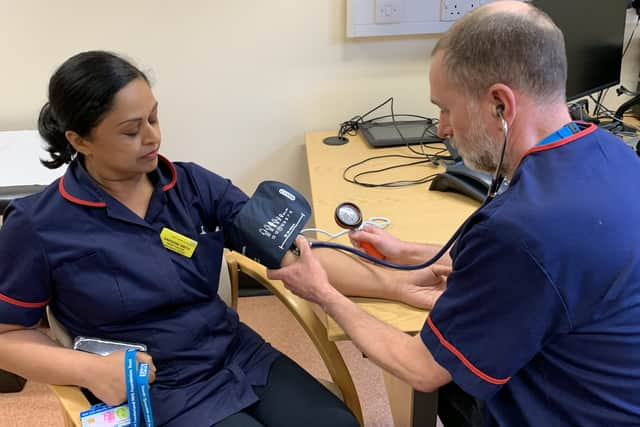NHS workers take to the road as part of Heart Failure Awareness Week
and live on Freeview channel 276
South Tyneside and Sunderland NHS Foundation Trust is backing Heart Failure Awareness Week, which runs from Monday, April 29.
The aim of this year’s campaign is to ‘detect the undetected’ and help people think about whether they could be affected by the condition. It can be diagnosed through a simple blood test through a GP.
Advertisement
Hide AdAdvertisement
Hide AdThe information drive will stress the importance of early intervention to those who have heart failure. It will also help make sure people get any treatment they need and are offered support to help them live well.
An estimated 1 million people in the UK have heart failure, with 200,000 new diagnoses every year.
However, it is estimated a further 400,000 people have it but are undetected, undiagnosed, and therefore missing out on life-preserving treatments.
The Trust’s Cardiology Service will be supporting the awareness drive.
Advertisement
Hide AdAdvertisement
Hide Ad

Dr Mickey Jachuck, Trust’s Clinical Director for Cardiothoracic Medicine and Clinical Microbiology and Infection said: "This awareness week gives us the chance to get that conversation started with people and get them thinking about their health and wellbeing. It also gives them the information they need to look out for their loved ones too.
"Health failure doesn’t mean the heart is about to stop, but that phrase is used to help describe a series of conditions. The Pumping Marvellous Foundation call it ‘heart inefficiency’ which perhaps better describes it and explains that it means the heart isn’t working correctly.
"It can be caused by lots of conditions and there are treatments we can offer and lifestyle changes people can make to live well.
Advertisement
Hide AdAdvertisement
Hide Ad"The events we have coming up in our hospitals and out in our communities will help get people thinking about whether they could be among those who are undiagnosed and take steps so they can look after their future."
Across the Trust, members of the cardiology team will be championing the Pumping Marvellous Foundation’s slogan Let’s BEAT Heart Failure.
BEAT stands for three of its symptoms and its prompt to act: ‘Breathlessness, Exhaustion, Ankle swelling and Time for a simple blood test - ask your GP.’
Other symptoms include:
- reduced ability to exercise
- a fast heart rate
- a persistent cough
Symptoms can develop quickly or gradually over weeks or months.
Advertisement
Hide AdAdvertisement
Hide AdMembers of the team, who are based at South Tyneside District Hospital, will be joining the Key Community Bus as it visits a series of locations during the week. They will chat to people to help them think about whether they or their loved ones have symptoms.
On Tuesday, April 30, the bus will be on Campbell Park Road in Hebburn, near to the Hebburn Family Hub, from 10.30am to noon and then at Hedworthfield Community Association in Cornhill, Fellgate, Jarrow, from 12.30pm to 2pm.
On Wednesday, May 1, the team will join the bus as it parks up at the Rose and Crown pub in Prince Edward Road, South Shields, from 10.30am to noon and then at Ocean Road Community Association from 12.30pm to 2pm.
Advertisement
Hide AdAdvertisement
Hide AdMembers of the service will also be promoting the campaign in the main entrance of the hospital and in its restaurant.
Their counterparts based at Sunderland Royal Hospital will also host a stall in its main entrance and be on hand during lunchtimes to chat to visitors, patients and colleagues.
For more information about heart failure, its impact, causes and how it can be treated visit the NHS information page on the condition.
